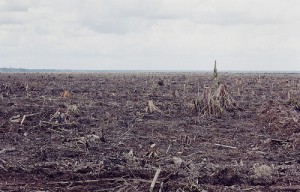The World Business Council on Sustainable Development (WBCSD), a group of 200 international corporations who claim commitments to sustainability, has put APRIL, Indonesia’s second largest and now most destructive pulp and paper company, on notice. APRIL has been placed on probation and the WBCSD will revoke its membership unless it can prove that it has ended its long-standing practices of rainforest destruction.
The WBCSD, which counts PepsiCo and Monsanto as members, isn’t your usual advocacy group. It’s essentially a club of large multi-national corporations. To have them find that one of their own is so bad they are expelled sends the unequivocal message that APRIL is a rouge company. It’s also a clear signal to businesses that buy pulp and paper or finance the company that they should sever ties with APRIL as well as the web of companies controlled by Sukanto Tanoto, APRIL’s notorious owner. However, it is unclear whether this condemnation will be sufficient to push an end to the egregious practices of APRIL and its sister companies.
RAN worked with WWF and Greenpeace last year to convince the Forest Stewardship Council (FSC) to disassociate itself from APRIL due to its destructive social and environmental practices. Unfortunately, the FSC action failed to achieve any major changes from APRIL, which is still logging and converting to monoculture plantations an estimated 12,000 acres of rainforest a month, often on land stolen from local communities. APRIL has 12 months to comply with the WBCSD Roadmap, which outlines proposed steps to end forest conversion and to conserve natural forests. If APRIL and its sister companies follow the principles of the Roadmap that the WBCSD has laid out — which include an immediate cessation of logging of rainforests — it will be a good start. But the WBCSD provisions do not go nearly far enough to ensure responsible forestry practices by APRIL. The scope must apply to APRIL and its sister companies and their supply chain partners. Suppliers and their performance must be independently verified.
These companies must address the myriad of social issues, land conflicts, and human rights violations that they and their suppliers are responsible for. They must end any further incursions on carbon-rich peatlands. And they must address the legacy of negative environmental and social impacts, properly resolve land and social conflicts, and restore key ecological and hydrological areas that have been destroyed.
APRIL has a long history of broken promises, forest destruction, and human rights abuses. Clearing intact rainforests to feed its pulp mills appears to be its key business model, with 60% of its fiber supply coming directly from the rainforest. This is a clear signal from the business community that APRIL’s current practices cannot continue. This must stop now. Twelve months is too long. For years, APRIL has offered only broken promises. Until APRIL can come into compliance with responsible forest practices, even beyond what is outlined in the WBCSD’s Roadmap, companies must cancel their contracts with this notorious forest destroyer. To read the full text of the WBCSD complaint, click here.
